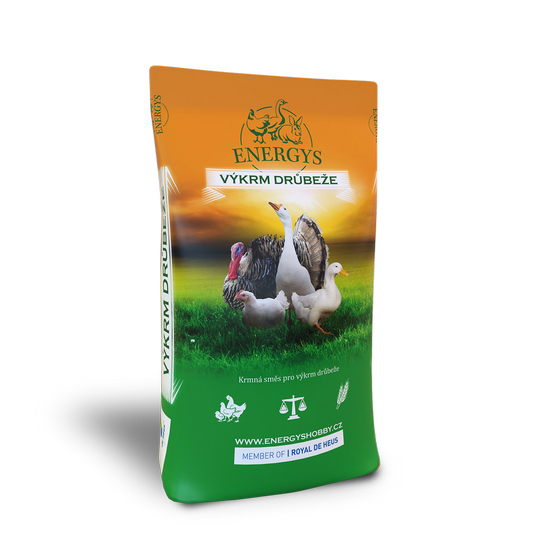Rabbits
Poultry
Laying hens
Quails
Guinea pigs
Pigs
Ostriches
Sheep and goats
Pigeons
Pheasants
Forest animals
Feeding turkeys
If you are new to breeding turkeys, be sure to read the following text, which summarizes what you should watch out for when fattening these animals.
Feeding very heavy turkey hens and especially turkey cocks at home has been very popular with breeders over the last several decades. Breeders tend to purchase approx. six-week-old broad-breasted turkey chicks. Not many people are involved in hatching and caring for small turkey chicks, with the exception of breeding purebred turkeys. These are capable of hatching and caring for their own chicks. Their weight and musculature is no match to those of broad-breasted hybrid turkeys.Feeding turkeys required special knowledge and the use of feeding mixtures is beneficial, as this helps to achieve high final weights even more than 20 kg especially in broad-breasted turkeys. Traditional fodder can be used to some extent (approximately 30%) at smaller farms to improve the culinary properties of meat.
Health problems
The state of health of chicks is a major problem – most frequent issue being blackhead, which poses permanent threat especially to younger turkeys up to 12 weeks old and is associated with a high death rate. The disease is caused by a protozoan called Histomonas meleargridis, which damages the intestines and liver of young turkeys (and other types of poultry). It is transferred via eggs of the Hetarakis gallinarum worms (paddocks can be infested with these worms). Separating young turkeys from other poultry and contaminated paddocks is the best prevention. Deworming animals and decontamination of poultry paddocks is suitable and giving animals higher doses of vitamins is helpful.
Unsuitable drugs
Unsuitability of the available drugs for meat poultry is currently a problem. Metronidazole, which proved to be effective in past (often in entizole tablets), or its veterinary alternatives are not intended for treatment or prevention in animals bred for human consumption. Metronidazole may be used to treat serious infections in humans, such as borreliosis, infection with clostridium or gastric ulcers and there are concerns that uncontrolled used for animals may reduce the efficacy of this drug in humans.
Take care not to exchange fodder
The necessity of using specific feeding mixtures for the specified species or categories of animals – certain components (such as coccidiostats) may even be poisonous or unsuitable for other species – this applies to exchanging feeding mixtures for chickens and turkey chicks. Feeding mixtures are now so specific, it is worth reading the enclosed information carefully and observing them.
Related posts
16. March 2022
When selecting feed (not only) for poultry, it is essential to base it on the purpose of the breeding or fattening phase. Energys hobby feeds accentuate these needs, so you are sure to choose whatever stage of development your poultry is in. But how do you choose the right feed and which is the most…
16. March 2022
When selecting feed (not only) for poultry, it is essential to base it on the purpose of the breeding or fattening phase. Energys hobby feeds accentuate these needs, so you are sure to choose whatever stage of development your poultry is in. But how do you choose the right feed and which is the most…
9. December 2021
While there are technological procedures for the rearing and fattening of common species and utility types of poultry, there are only few instructions for the so-called non-traditional poultry species, but also for runners with potential for commercial use. In this article you will find basic information on the breeding of Barbary and Mallard ducks.
22. February 2021
Spring is the period when chickens start to be fattened in domestic conditions. For the purposes of meat production, it is best to use specially-bred hybrid meat breeds that have the genetic properties of fast growth and high muscle mass. These breeds are called broiler chickens or broilers.
20. November 2020
When feeding and fattening ducks and geese, it is important to be aware of the differences between the main nutritional requirements. Experienced breeders are familiar at least with the basic differences between geese, ducks and Muscovy ducks.
Related products

POULTRY UNI 30
A mashed concentrate for fattening of all categories of poultry, which includes the highest quality soja. It is mixed with cereals in a ratio of 20-40% (by type or phase of fattening). It contributes to fast growth and a high meat content. It does not contain coccidiostats.

BROILER MAXI
Feed for the final phase of fattening broilers. Supports a high meat content and a delicate meat taste. Start using it 5 or more days before slaughter. Does not contain coccidiostatics.

BROILER MIDI FORTE
A granulated feed mix for the intensive fattening of broilers from 15 days of age to a minimum of 5 days before ending feeding up. The Coccidiostat included lowers mortality during fattening. For the next phase of fattening Broiler MAXI is a suitable mix.

BROILER MINI FORTE
A ground feed mix with Coccidosistats, for the intensive feeding of broiler chickens up to 14 days of age and a support to fast growth a an excellent state of health in your broliers-

DUCK MINI
A high quality ground mix for fattening ducks and geese up to their 2nd week. It is suitable for fast growth and high meat content.

TURKEY MAXI
Feed for the final stage of turkey fattening. Use from the 13th week of age. It does not contain a coccidiostat.

TURKEY MIDI FORTE
A high quality granulated feed with coccidiostats for feeding turkeys from 5 to 12 weeks of age. It is the basis for fast growth, high meat content and an excellent state of health of your turkeys. The coccidiostat content lowers mortality during feeding. It continues on from feeding with Turkey Mini Forte. The live weight for turkeys at the end of this period should be around 5.9 kg for hen turkeys and 8.9 kg for cocks.

TURKEY MINI FORTE
A ground mix with Coccidiostats for fattening turkeys up to an age of 4 weeks. It is the basis for high meat content. Afterwards use the Turkey Midi Forte mix.

DUCK MAXI
A granulated mix for feeding ducks and geese from 3 weeks of age up to slaughter. The nutrients it contains support fast growth , a high meat content and a delicate meat taste.
